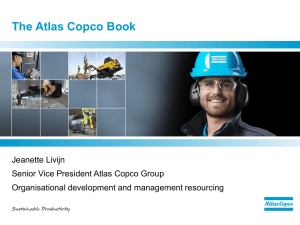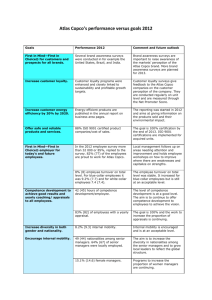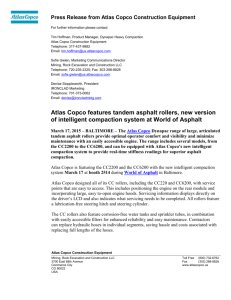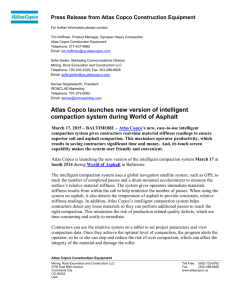Answers to Contracts Practice Essay
advertisement
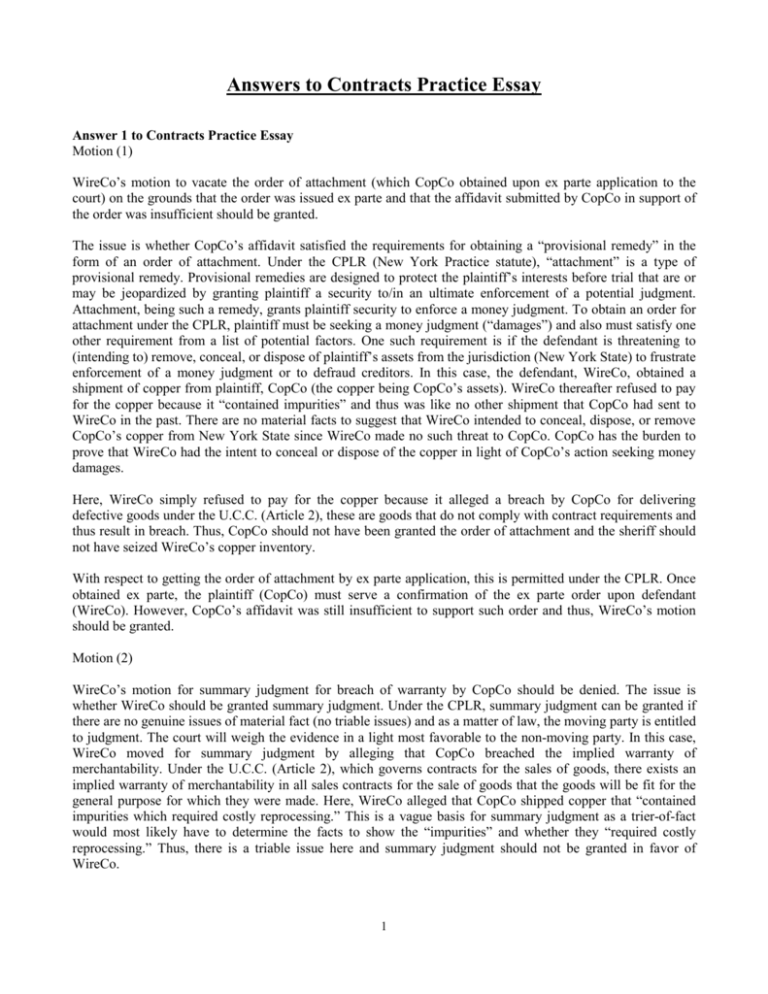
Answers to Contracts Practice Essay Answer 1 to Contracts Practice Essay Motion (1) WireCo’s motion to vacate the order of attachment (which CopCo obtained upon ex parte application to the court) on the grounds that the order was issued ex parte and that the affidavit submitted by CopCo in support of the order was insufficient should be granted. The issue is whether CopCo’s affidavit satisfied the requirements for obtaining a “provisional remedy” in the form of an order of attachment. Under the CPLR (New York Practice statute), “attachment” is a type of provisional remedy. Provisional remedies are designed to protect the plaintiff’s interests before trial that are or may be jeopardized by granting plaintiff a security to/in an ultimate enforcement of a potential judgment. Attachment, being such a remedy, grants plaintiff security to enforce a money judgment. To obtain an order for attachment under the CPLR, plaintiff must be seeking a money judgment (“damages”) and also must satisfy one other requirement from a list of potential factors. One such requirement is if the defendant is threatening to (intending to) remove, conceal, or dispose of plaintiff’s assets from the jurisdiction (New York State) to frustrate enforcement of a money judgment or to defraud creditors. In this case, the defendant, WireCo, obtained a shipment of copper from plaintiff, CopCo (the copper being CopCo’s assets). WireCo thereafter refused to pay for the copper because it “contained impurities” and thus was like no other shipment that CopCo had sent to WireCo in the past. There are no material facts to suggest that WireCo intended to conceal, dispose, or remove CopCo’s copper from New York State since WireCo made no such threat to CopCo. CopCo has the burden to prove that WireCo had the intent to conceal or dispose of the copper in light of CopCo’s action seeking money damages. Here, WireCo simply refused to pay for the copper because it alleged a breach by CopCo for delivering defective goods under the U.C.C. (Article 2), these are goods that do not comply with contract requirements and thus result in breach. Thus, CopCo should not have been granted the order of attachment and the sheriff should not have seized WireCo’s copper inventory. With respect to getting the order of attachment by ex parte application, this is permitted under the CPLR. Once obtained ex parte, the plaintiff (CopCo) must serve a confirmation of the ex parte order upon defendant (WireCo). However, CopCo’s affidavit was still insufficient to support such order and thus, WireCo’s motion should be granted. Motion (2) WireCo’s motion for summary judgment for breach of warranty by CopCo should be denied. The issue is whether WireCo should be granted summary judgment. Under the CPLR, summary judgment can be granted if there are no genuine issues of material fact (no triable issues) and as a matter of law, the moving party is entitled to judgment. The court will weigh the evidence in a light most favorable to the non-moving party. In this case, WireCo moved for summary judgment by alleging that CopCo breached the implied warranty of merchantability. Under the U.C.C. (Article 2), which governs contracts for the sales of goods, there exists an implied warranty of merchantability in all sales contracts for the sale of goods that the goods will be fit for the general purpose for which they were made. Here, WireCo alleged that CopCo shipped copper that “contained impurities which required costly reprocessing.” This is a vague basis for summary judgment as a trier-of-fact would most likely have to determine the facts to show the “impurities” and whether they “required costly reprocessing.” Thus, there is a triable issue here and summary judgment should not be granted in favor of WireCo. 1 As to “judgment as a matter of right” element of summary judgment, WireCo would be entitled to judgment because there is an implied warranty of merchantability in the contract between WireCo and CopCo. However, since there is a triable issue as to whether CopCo breached the warranty, WireCo cannot obtain summary judgment. It should be noted that since CopCo opposed WireCo’s motion on the ground that no implied warranty existed but failed to assert the ground that no breach occurred, WireCo may then obtain summary judgment because as stated above, an implied warranty of merchantability does exist in their contract. Also, CopCo’s contention that WireCo’s motion for summary judgment should fail because of the dispute over cost of reprocessing would not be sufficient to overcome summary judgment if it does not raise a triable issue; and it very likely will not; that is, the court can grant summary judgment to WireCo on the liability issue and grant an “inquest” to decide the issue of damages, to the extent that CopCo’s “cost of reprocessing” contention only involves damages, not a triable issue. Motion (3) CopCo’s motion for summary judgment should be denied. Under the CPLR, there can be no triable issues of material fact and as a matter of law, moving party is entitled to judgment in order to obtain summary judgment. Here, CopCo argued that WireCo gave no consideration for CopCo’s promise to keep the “same price” for two years. Consideration is defined as a bargained-for legal detriment where the offeror’s promise induces the offeree’s detriment and vice versa. Here, WireCo did give consideration in that it gave up the option to buy copper from any other party except for CopCo in exchange for CopCo’s promise to maintain the price (Their agreement concerning this price arrangement was in writing and required under the U.C.C. if for $500 or more). Thus, because there is a triable issue in that a trier-of-fact could possibly find that WireCo did give consideration, CopCo’s motion must be denied. Answer 2 to Contracts Practice Essay (1) The court should grant WireCo’s motion to vacate the order of attachment. The issues are whether CopCo met the requirements for an order of attachment and whether an ex parte order should have been granted. An order of attachment is a provisional remedy available to a party who is seeking monetary damages where the defendant poses some security risk indicating that the claimant may not be able to recover any judgment. A party must demonstrate that such a security risk exists in showing, for example, that the defendant is a nondomiciliary of the state, or the defendant has threatened to remove its property from the state so as to frustrate the plaintiff’s attempts to recover on the judgment. In this case, CopCo failed to demonstrate sufficient need for an order of attachment. In its affidavit accompanying its application, CopCo merely made conclusory allegations regarding WireCo’s likelihood of removing or disposing of the property. CopCo did not, as it should have, proffer any specific facts regarding the basis for such allegations and because there is no evidence that WireCo is actually planning to move property out of state for purposes of frustrating CopCo’s judgment, the court should not have granted the application for writ of attachment. Moreover, CopCo failed to provide the required undertaking. Indeed, there appears to be no genuine threat of WireCo’s moving property out of state -- CopCo and WireCo have been doing business together for years and it would probably be an enormous effort for WireCo to move its entire operation out of state. All of this also demonstrates why an ex parte order was inappropriate, particularly without an undertaking to indemnify WireCo for any losses it may suffer as a result of an erroneous attachment. 2 Application for orders of attachment may be made either by motion on notice (providing a return date of at least 8 days) or by ex parte application if exigent circumstances exist indicating that swift judicial action is necessary. If an ex parte order is granted, the applicant must follow up with a motion to confirm the order within 5 days (10 for a non-domiciliary) of the order. CopCo failed to do so. CopCo also failed to show any exigent circumstances requiring an order to issue without first holding an adversarial hearing. (2) WireCo’s motion for summary judgment as to the issue of the existence of an implied warranty of merchantability should be granted. As to the separate issues of whether CopCo breached the warranty and what damages resulted from the breach (if any), those are fact questions that should be left for the jury. Summary judgment is appropriate as to any issue when the moving party has demonstrated that, in viewing the facts in the light most favorable to the non-moving party, no genuine issue of material fact exists and that the moving party is entitled to judgment as a matter of law. In this case, there is no genuine issue of fact precluding the conclusion that CopCo made an implied warranty of merchantability with respect to its copper. Copper, a moveable chattel removed from the ground prior to sale, is a “good” and the contract between CopCo and WireCo is therefore covered by the UCC. CopCo is a “merchant” dealing in goods of the kind that are the subject of the contract. Accordingly, to the extent the UCC imposes higher standards on merchants (and especially on those who deal in goods of the kind) CopCo will be subject to those stricter requirements. As to all contracts in which a merchant dealing in goods of the kind sells those goods, the UCC imposes an implied warranty of merchantability that the goods are fit for their ordinary purpose. While it is possible to disclaim such a warranty, a merchant must do so expressly and it must be conspicuously noted on the writing. In this case, there is no factual dispute regarding the fact that CopCo is a merchant and that an implied warranty of merchantability arose. The only issue could be that CopCo disclaimed the warranty by its notation on the back of its contract. This notation however, is far from express and does not purport to disclaim the implied warranty of merchantability, but instead purports to disclaim a different warranty under the UCC, the implied warranty of fitness for a particular purpose. (“We are not able to assure you that it will serve your purposes.”) Thus, the implied warranty of merchantability arose as a matter of law. While there is some factual issue regarding whether CopCo breached the implied warranty of merchantability by shipping copper with impurities (do ordinary users need impurity-free copper or is WireCo’s use unique?), that issue can be saved for the jury. Moreover, the fact that the issue of damages remains never precludes partial summary judgment. Even if the court were to decide that CopCo breached the implied warranty of merchantability as a matter of law, it could hold an inquest to ascertain the extent of WireCo’s damages. It should further be noted that WireCo was entitled to reject the defective shipment of copper because this is an installments contract and although the perfect tender rule does not apply, a buyer is entitled to reject a particular shipment if the goods are defective such that the value of that shipment is substantially impaired. (3) CopCo’s motion for summary judgment should be denied. A motion for summary judgment may be filed after the defendant has filed its answer (neither party may file for summary judgment before the answer unless plaintiff is entitled to file for summary judgment in lieu of complaint -- plaintiff not seeking to recover on a negotiable instrument, so summary judgment in lieu of complaint is not applicable). As explained in the prior part, summary judgment is only proper if there is no genuine issue of material fact and that moving party is entitled to judgment as a matter of law. 3 In this case, CopCo alleges that there was no new contract between CopCo and WireCo because of lack of consideration. In New York consideration is defined as a bargained for exchange of legal detriment. The contract might not fail for consideration for the precise reasons set forth by CopCo -- WireCo had an opportunity to pursue another contract with BadCo and did not, which is sufficient for purposes of consideration. CopCo’s argument is that WireCo had a pre-existing duty to purchase its requirements from CopCo and therefore, in agreeing to continue to purchase its requirements it gave up nothing, it only did what it was obligated to do. We don’t know whether CopCo and WireCo had a contract in writing that would have in fact obligated WireCo to continue purchasing its requirements from CopCo even if CopCo raised its prices. Arguably, WireCo would not have entered into such a contract given the risk that CopCo would raise its prices. Indeed, the court could conclude, based on the facts before it, that WireCo is entitled to summary judgment in its favor even though WireCo did not move. 4
